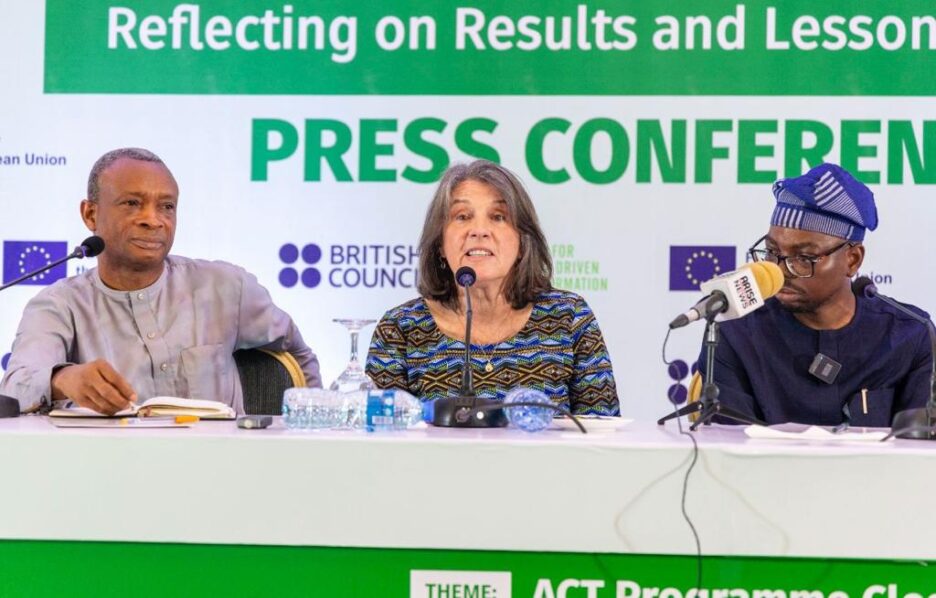
The European Union (EU) and stakeholders across civil society bodies yesterday in Abuja raised concerns over sustainable development in the country as the Agents for Citizen-driven Transformation (ACT) was brought to a close in 10 states.
Raising concerns over the current rising cost of living in Nigeria, poor governance, effective utilisation of aid amidst shrinking donor and funding support, the stakeholders, who gathered at the close out ceremony of ACT programme noted the need to address the bureaucracy in government ministries and agencies as they decried the implications on national development.
The stakeholders also insisted that unless the capacity of CSOs are strengthened, sustainable development may remain challenging in Nigeria.
The ACT Programme funded by the EU and implemented by the British Council in 10 states was designed to strengthen the capacity of CSOs and to make them more impactful.
EU Ambassador to Nigeria, Samuela Isopi said the EU has invested in the programme for the last five years, adding that the programme has also supported the development of a self-regulatory framework for CSOs, which has been adopted nationwide.
It recalled that five years after the completion of the programme in 2024, ACT had reached and strengthened the organizational capacity of at least 273 CSOs in nine states Adamawa, Borno, Edo, Enugu, Kano, Lagos, Plateau.
Rivers, and Sokoto and the Federal Capital Territory (FCT).
Isopi said: “The program has trained over 200 civil society organization networks and provides them with rigorous coaching and mentoring to support them. put into practice the lessons learned 151 The grounds have been given to civil society organizations and the 15 toolkit developed and made available for use by civil society organizations.
“The program has supported the development of a self-regulatory framework for civil society organizations, which has been adopted by civil society organizations across the country. Let me tell you that this whole discussion started already when I was in Nigeria as a head of trade and I remember that the issue of self regulation by civil society back in 2012 to 14, was a new issue.
“And I’m thrilled and delighted to hear that over the years really the issue of self regulation has been mainstreamed. And that, in fact, today, serious civil society organizations in Nigeria, they really accept the self regulation principle and are ready to abide by them. Really, it’s a great time, really, for me it’s a great achievement. And the program has been at the forefront of advocacy efforts to ensure that the operational environment remains favorable for civil society operations.
The Director of Open Societies Work in Sub Saharan Africa at the British Council, Lucy Pearson, noted that the focus of this support has been around organizational capacity and helping civil societies govern themselves. And as a result, they can better serve their communities and establish themselves on a sustainable footing and I think the program has achieved.
“But I think what’s often the case with civil society, not just in Nigeria, but I think elsewhere, is they sometimes lack the organizational structures, and the capacities and there’s certain things that they maybe don’t do properly. So I think this program has enabled a lot of users, not just those weak directly workers, but others to benefit from it.”
Also speaking, the ACT National Programme Manager, Damilare Babalola noted that the programme achieved its set objectives by empowering CSOs on how to comply with legal regulations of the country and also how they can self-regulate their system and sanitize that environment.
Babalola said: “We have worked with about 273 CSOs, out of which 233 was under the capacity development support in 10 states.
“While 40 network of CSOs in the area of enabling regulatory environment and this our work cut across the 36 states and the FCT.”
He said ACT has also worked with strategic agencies of the government to improve compliance to regulations
“We work with these agencies collaboratively over the last four to five years by ensuring that they understand the role of CSOs.
“And also ensure that citizens understand the mandate of these agencies in terms of how they regulate the space they work with,” he said.
Up to 2,808 personnel of the CSOs and 1,302 network leaders directly benefitted from the programme’s support.
Furthermore, CSOs, government agencies and other stakeholders gained a better understanding of civil society regulatory issues, leading to several key policy- and decision-makers committing to addressing identified issues.



